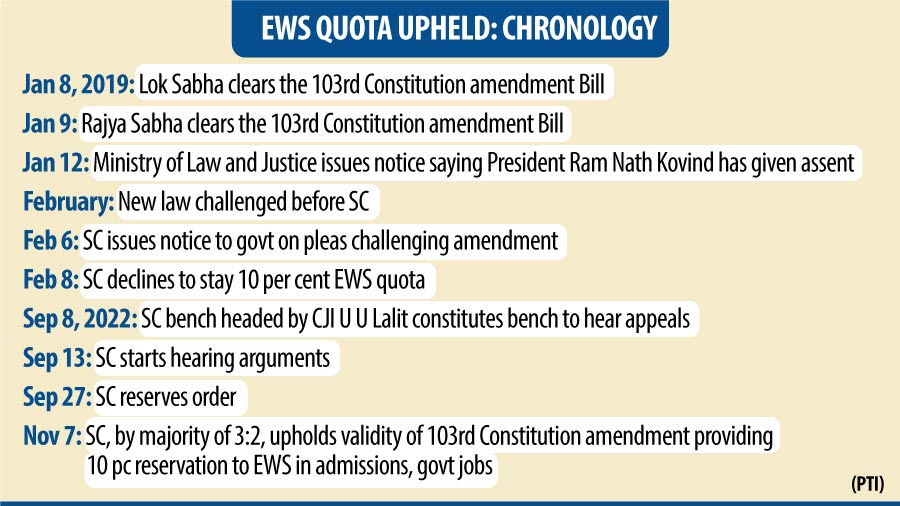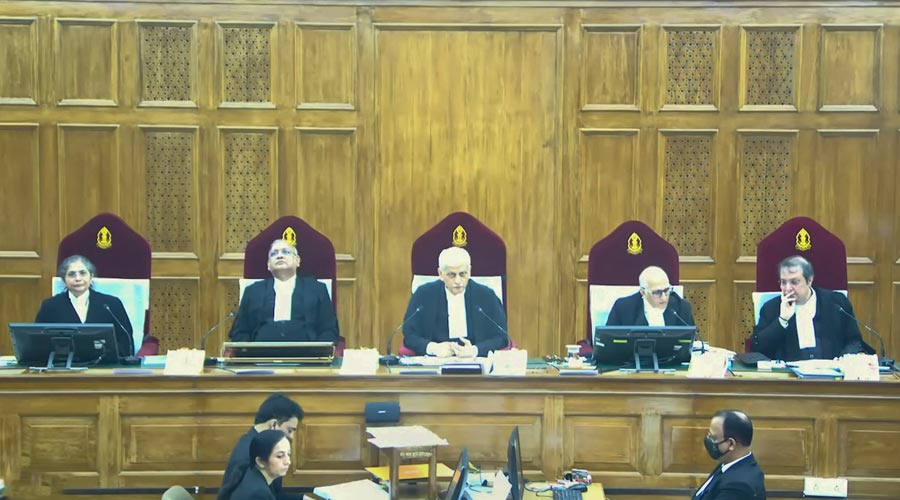The Supreme Court, by a majority view of 3:2, on Monday upheld the validity of the 103rd Constitution amendment providing 10 per cent reservation to people belonging to economically weaker sections (EWS) in admissions and government jobs.
The top court said the law on EWS quota does not violate the basic structure of the Constitution.
At the outset, Chief Justice U U Lalit said there are four different judgements on pleas challenging the EWS quota.
Justice Dinesh Maheshwari, who read the judgement for himself, said the 103rd constitutional amendment cannot be said to breach the basic structure of the Constitution.
Justice Bela M Trivedi said the 103rd constitutional amendment cannot be struck down on grounds of being discriminatory.
Justice J B Pardiwala concurred with their views and upheld the validity of the amendment.
But Justice S Ravindra Bhat, in a minority view, dissented and struck down the constitution amendment on EWS quota. CJI Lalit concurred with the view of Justice Bhat.

TTO Graphics
The quota bypassed affirmative action that benefits communities traditionally marginalised in Indian society, like the Scheduled Caste and Scheduled Tribes (SC/STs) and Other Backward Classes (OBCs).
The quota was introduced through the 103rd constitutional amendment, cleared in January 2019 by the Centre soon after the ruling BJP lost the Madhya Pradesh, Rajasthan and Chhattisgarh elections. It was instantly challenged in the Supreme Court.
Petitions had questioned how the quota could cross the 50 per cent national cap on reservation set by the Supreme Court in 1992 and whether it changed the "basic structure" of the constitution.
In his dissenting view Justice Bhat said, "Economic destitution, economic backwardness is backbone of this amendment and on this account amendment is constitutionally indefeasible. However, excluding the classes such as Scheduled Caste/Scheduled Tribes, Other Backward Classes (OBC) is not constitutionally permissible," Justice Bhat said.
On September 22, the Supreme Court had reserved its verdict on a batch of pleas challenging the validity of the 103rd Constitution amendment providing 10 per cent reservation to economically weaker sections (EWS) persons in admissions and government jobs.
A five-judge Constitution bench headed by Chief Justice Uday Umesh Lalit reserved the verdict on the legal question of whether the EWS quota violated the basic structure of the Constitution after hearing a battery of senior lawyers including Attorney General K K Venugopal and Solicitor General Tushar Mehta in the marathon hearing that lasted for six-and-half-day, according to PTI.
The top court heard as many as 40 petitions and most of the pleas, including the lead one filed by 'Janhit Abhiyan' in 2019, challenged the validity of the Constitution Amendment (103rd) Act 2019.
Three broad issues
The bench, on September 8, had framed three broad issues for adjudication arising from the pleas challenging the Centre's decision to grant 10 per cent reservation to EWS in admissions and jobs.
The bench had said the three issues suggested by the attorney general for the decision "broadly" covered all the aspects relating to the petitions on the constitutional validity of the decision to grant the reservation.
"Whether the 103rd Constitution amendment Act can be said to breach the basic structure of the Constitution by permitting the State to make special provisions, including reservation, based on economic criteria," read the first issue framed.
Private unaided institutions
The second legal question was whether the constitutional amendment could be said to breach the basic structure by permitting the state to make special provisions concerning admissions to private unaided institutions.
"Whether the 103rd Constitution amendment can be said to breach the basic structure of the Constitution in excluding the SEBCs/OBCs, SCs/STs from the scope of EWS reservation," the third issue, to be adjudicated upon by the bench, read.
The doctrine of basic structure was propounded by the top court in 1973 while deciding the Keshavananda Bharati case. It was held that Parliament could not amend every bit of the Constitution, and aspects such as rule of law, separation of powers, and judicial freedom formed part of the "basic structure" of the Constitution and hence, could not be amended.
Quotas in admissions and public services
The Centre, through the 103rd Constitutional Amendment Act, 2019, introduced the provision for Economically Weaker Sections (EWS) reservation in admissions and public services.
Earlier, the Centre, in 2019, had also told the apex court that its law, granting a 10-per cent quota for Economically Weaker Sections (EWSs), was brought in to promote "social equality" by providing "equal opportunities in higher education and employment to those who have been excluded by virtue of their economic status".
The Lok Sabha and the Rajya Sabha cleared the bill on January 8 and 9 in 2019 respectively and it was then signed by then President Ram Nath Kovind. The EWS quota is over and above the existing 50 per cent reservation to SCs, STs, and Other Backward Classes (OBCs).













